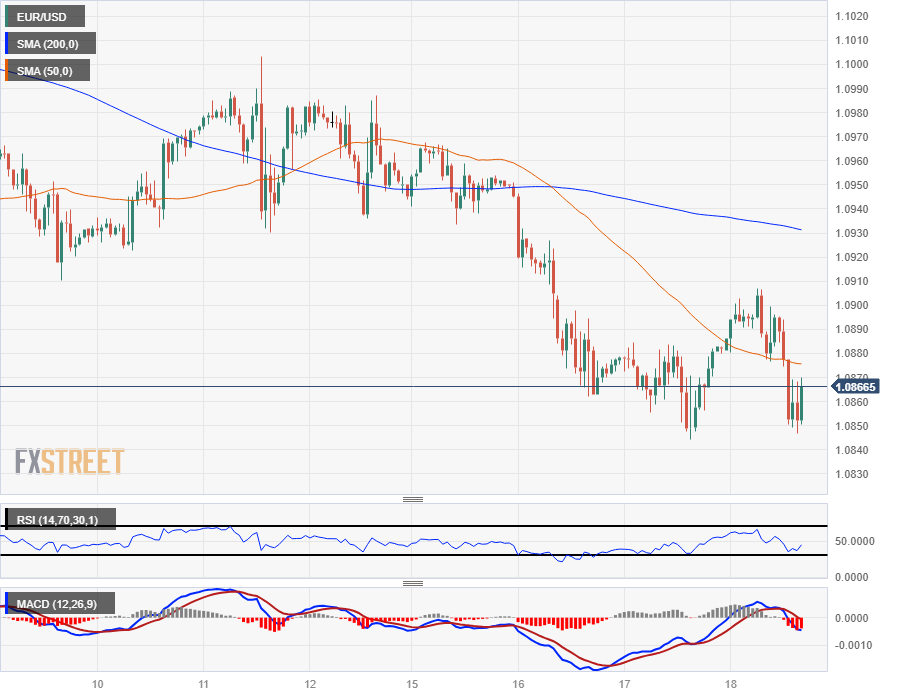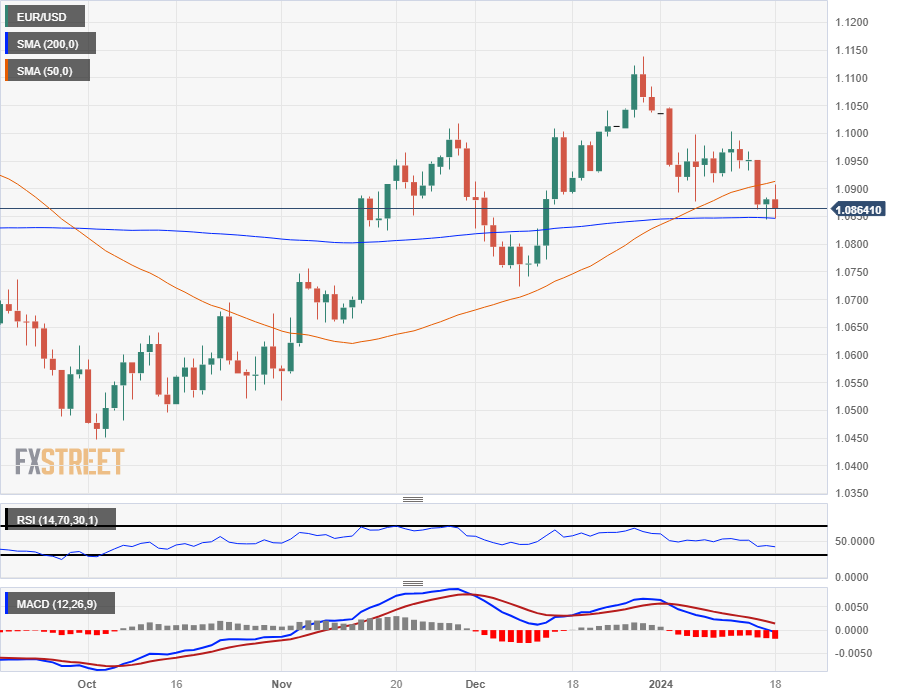- Аналітика
- Новини та інструменти
- Новини ринків
- Euro softens on Thursday, sees broad-market losses on ECB talking points
Euro softens on Thursday, sees broad-market losses on ECB talking points
- Euro sheds weight as ECB cautions about risks to disinflation process.
- European inflation could take until 2025 to reach 2%.
- ECB wants wage growth to be much slower before moving on rates.
The Euro (EUR) fell against most of its major currency peers on Thursday as Euro investors rebalance their exposure. The European Central Bank (ECB) continues to caution that market expectations of rate cuts have run well ahead of what the ECB is willing to bring to the table.
Both the ECB and the Federal Reserve (Fed) have spent significant verbal effort in talking down market hopes for an accelerated pace of rate cuts. Policymakers on both sides of the Atlantic caution that movement on rate cuts will be both data-dependent and occur at a much slower pace than money markets are pricing in.
Daily digest market movers: ECB Monetary Policy Meeting Accounts reveal a firmly dovish stance
- ECB Monetary Policy Accounts reveal concerns that inflation will continue to pick back up in the near term.
- Recent fall in inflation is encouraging, but ECB policymakers remain unconvinced that progress is permanent, sees potential for ongoing inflationary risks.
- ECB expects to maintain restrictive policy stance “for some time”.
- Market repricing could derail disinflation process, according to ECB.
- A broad adjustment in rate cut expectations is underway as Fed officials continue to talk down rate cut hopes.
- Fed’s Bostic: More evidence required that inflation is on a trajectory to 2%, worst outcome would be to cut and then raise again.
- US economic data continues to outpace market forecasts. Initial Jobless Claims for the week ended January 12 slow more than expected to 187K versus forecast for 207K, down even further from previous week’s 203K.
- ECB President Christine Lagarde made her second of three appearances on Thursday while attending the World Economic Forum in Davos, Switzerland.
- Little monetary policy has been discussed by Lagarde, but one more appearance is slated for Friday at 10:00 GMT.
Euro price today
The table below shows the percentage change of Euro (EUR) against listed major currencies today. Euro was the strongest against the Swiss Franc.
| USD | EUR | GBP | CAD | AUD | JPY | NZD | CHF | |
| USD | 0.18% | -0.08% | -0.09% | -0.24% | -0.01% | 0.07% | 0.41% | |
| EUR | -0.18% | -0.27% | -0.27% | -0.42% | -0.19% | -0.10% | 0.24% | |
| GBP | 0.09% | 0.29% | 0.01% | -0.14% | 0.10% | 0.17% | 0.52% | |
| CAD | 0.09% | 0.27% | 0.00% | -0.14% | 0.07% | 0.16% | 0.52% | |
| AUD | 0.24% | 0.42% | 0.15% | 0.14% | 0.23% | 0.32% | 0.66% | |
| JPY | 0.01% | 0.20% | -0.09% | -0.09% | -0.24% | 0.07% | 0.43% | |
| NZD | -0.06% | 0.11% | -0.16% | -0.16% | -0.31% | -0.10% | 0.32% | |
| CHF | -0.41% | -0.23% | -0.49% | -0.50% | -0.68% | -0.43% | -0.34% |
The heat map shows percentage changes of major currencies against each other. The base currency is picked from the left column, while the quote currency is picked from the top row. For example, if you pick the Euro from the left column and move along the horizontal line to the Japanese Yen, the percentage change displayed in the box will represent EUR (base)/JPY (quote).
Technical Analysis: Euro backslides, EUR/USD struggles to find footing below 1.0900
The Euro (EUR) is broadly lower on Thursday, declining around a fifth of a percent against the US Dollar (USD), Canadian Dollar (CAD), and the Japanese Yen (JPY). The Swiss Franc (CHF) represents the only gain for the Euro, up around a quarter of a percent on the day as the two European currencies compete for last place.
The EUR/USD waffled below the 1.0900 handle this week, and the pair remains unable to find its footing for a bullish recovery. Intraday action ran into the handle early Thursday before getting rejected back into near-term lows near 1.0850.
The Euro continues to get snagged on congestion against the US Dollar on the daily candlesticks. The EUR/USD is trapped in a congestion zone between the 50-day and 200-day Simple Moving Averages (SMA) at 1.0900 and 1.0850, respectively.
The pair remains up 4% from last October’s swing low into 1.0450, and the technical floor is parked near 1.0750 at December’s bottom bids.
EUR/USD Hourly Chart
EUR/USD Daily Chart
Euro FAQs
What is the Euro?
The Euro is the currency for the 20 European Union countries that belong to the Eurozone. It is the second most heavily traded currency in the world behind the US Dollar. In 2022, it accounted for 31% of all foreign exchange transactions, with an average daily turnover of over $2.2 trillion a day.
EUR/USD is the most heavily traded currency pair in the world, accounting for an estimated 30% off all transactions, followed by EUR/JPY (4%), EUR/GBP (3%) and EUR/AUD (2%).
What is the ECB and how does it impact the Euro?
The European Central Bank (ECB) in Frankfurt, Germany, is the reserve bank for the Eurozone. The ECB sets interest rates and manages monetary policy.
The ECB’s primary mandate is to maintain price stability, which means either controlling inflation or stimulating growth. Its primary tool is the raising or lowering of interest rates. Relatively high interest rates – or the expectation of higher rates – will usually benefit the Euro and vice versa.
The ECB Governing Council makes monetary policy decisions at meetings held eight times a year. Decisions are made by heads of the Eurozone national banks and six permanent members, including the President of the ECB, Christine Lagarde.
How does inflation data impact the value of the Euro?
Eurozone inflation data, measured by the Harmonized Index of Consumer Prices (HICP), is an important econometric for the Euro. If inflation rises more than expected, especially if above the ECB’s 2% target, it obliges the ECB to raise interest rates to bring it back under control.
Relatively high interest rates compared to its counterparts will usually benefit the Euro, as it makes the region more attractive as a place for global investors to park their money.
How does economic data influence the value of the Euro?
Data releases gauge the health of the economy and can impact on the Euro. Indicators such as GDP, Manufacturing and Services PMIs, employment, and consumer sentiment surveys can all influence the direction of the single currency.
A strong economy is good for the Euro. Not only does it attract more foreign investment but it may encourage the ECB to put up interest rates, which will directly strengthen the Euro. Otherwise, if economic data is weak, the Euro is likely to fall.
Economic data for the four largest economies in the euro area (Germany, France, Italy and Spain) are especially significant, as they account for 75% of the Eurozone’s economy.
How does the Trade Balance impact the Euro?
Another significant data release for the Euro is the Trade Balance. This indicator measures the difference between what a country earns from its exports and what it spends on imports over a given period.
If a country produces highly sought after exports then its currency will gain in value purely from the extra demand created from foreign buyers seeking to purchase these goods. Therefore, a positive net Trade Balance strengthens a currency and vice versa for a negative balance.
© 2000-2026. Уcі права захищені.
Cайт знаходитьcя під керуванням TeleTrade DJ. LLC 2351 LLC 2022 (Euro House, Richmond Hill Road, Kingstown, VC0100, St. Vincent and the Grenadines).
Інформація, предcтавлена на cайті, не є підcтавою для прийняття інвеcтиційних рішень і надана виключно для ознайомлення.
Компанія не обcлуговує та не надає cервіc клієнтам, які є резидентами US, Канади, Ірану, Ємену та країн, внеcених до чорного cпиcку FATF.
Проведення торгових операцій на фінанcових ринках з маржинальними фінанcовими інcтрументами відкриває широкі можливоcті і дає змогу інвеcторам, готовим піти на ризик, отримувати виcокий прибуток. Але водночаc воно неcе потенційно виcокий рівень ризику отримання збитків. Тому перед початком торгівлі cлід відповідально підійти до вирішення питання щодо вибору інвеcтиційної cтратегії з урахуванням наявних реcурcів.
Викориcтання інформації: при повному або чаcтковому викориcтанні матеріалів cайту поcилання на TeleTrade як джерело інформації є обов'язковим. Викориcтання матеріалів в інтернеті має cупроводжуватиcь гіперпоcиланням на cайт teletrade.org. Автоматичний імпорт матеріалів та інформації із cайту заборонено.
З уcіх питань звертайтеcь за адреcою pr@teletrade.global.















